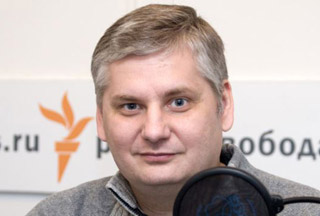Breaking down the world to geopolitical zones of influence will be better than chaos

Interview with Russian politician Sergey Marcedonov
-What do you think about Russia’s activities in Ukraine’s Crimea?
-Ukraine and the Crimea crisis should be divided into several parts. The first part would be the situation in the Crimea, the second one would be relations between Kiev and the Crimea, third – relations between Russia and Ukraine, and fourth – international relations that include relations between Russia and the West. When people say Russia does not have interests it is very strange because Russia has put down its interests long ago. In case of Ukraine Russia’s interest is not to let Ukraine become a member of NATO or any other alliance. The same is true about other post-Soviet countries. This theory has been published long ago and Russia has been implementing it. Back in 1997, when NATO was expanding due to Eastern Europe, Russia announced that it was the continuation of the frozen war, and such expansion would be negative. The next issue is the Black Sea and port. During the Soviet time the Crimea and Ukraine were a part of a big country, and a significant part of the Black Sea port infrastructure was concentrated in Sevastopol of the Crimea. When the Soviet Union collapsed, 70 per cent of its fleet appeared to be out of its area. This brought a lot of problems. These issues were negotiated for a long time but when the revolution took place in Ukraine, there was a risk that the agreements would not be enforced, and NATO would revise the status of Ukraine, and at that time Russia started to act the way it is acting now. If there were no pro-Russian attitude in the Crimea and if people do not want to go out of the territory of Ukraine, Russia would not be able to do anything. There are disputable issues in the world but neither Russia nor other countries are interfering because there are no prerequisites.
Speaking about the reasons why this happened, we should more focus on the fact that CIS in fact does not exist as it was established primarily by Russia and Ukraine. What is going to happen is something new? We will see this later. In fact now we witness the biggest tension between the West and Russia since the collapse of the Soviet Union. In 2008 we thought we had fallen in the deepest hole but now we see that we can fall deeper. The biggest problem with Ukraine is not the rule of dictatorship there but the fact that there is no power there. It is hard to understand with who we can negotiate.
-Don’t you think this is wrong estimation because there is government in Kiev, and there are opposition powers as well?
-Let’s differentiate propaganda streams which always exist in both the Russian and American policies. What is Moscow afraid of? Moscow is afraid of the fact that the people on power there are diverse politicians. There are fascists too, and the problem is not Yarosh or the Right Sector. Read what is saying Tyanibok, who is MP. There is a minister, whose second name is Paruby and was very active in the Maidan. His statements are known too. For example, PM Yatsenyuk announced that they should not rush to arrange the issues of visas, however minister Parubi said that “they do not give a damn about the Ukrainians that are in Russia.” In fact there is no authority there. An authority is not the one that sends people to patrol in streets with guns but the one that sends the police to patrol in streets. I think Moscow would be able to talk to nationalists too if it was a full and competent authority that would be able to control the law-enforcement and follow its promises.
-We saw that Russia closed the border for Ukrainian products.
-Anyway, they have not adopted a visa regime yet. I am not saying who is good or bad. I am analyzing the situation. The Maidan is not Ukraine; it is the opinion of the most active part of the Ukrainian society but it is not the whole Ukraine. I think many problems were a result of the fact that people did not understand this. Ukraine is very different. Kuchma wrote a book entitled “Ukraine is not Russia,” and now he’d be better to write another one and entitle is as “Ukraine is not the Maidan.” It is impossible to build a diverse country where the opinions of all layers of the society are not taken into consideration. For example, many people in Russia are right to criticize Putin for giving Chechnya and Ramzan Kadirov many rights. It is possible not to give such rich rights to Kadirov but in that case the question is whether Chechnya would stay in Russia. There are also critics that say Putin is giving a lot of money to the Caucasus and they say “Russia should no more feed the Caucasus.” Bu if you do not feed them, they will feed themselves by turning to another country that will take on that role. If you want to have diverse country, you have to respect the opinions of many groups of the society. It is difficult to talk to this kind of government, even though it exists formally.
-Does the announcement in Russia at the highest level that Ukraine’s government is not legitimate mean that Moscow in fact does not care if there is government in Kiev or no.
-Russia is interested because if there is no government, there are more risks and instability. Do you think the decision for the Crimea was easy for Russia? The Kremlin knows that it brings extra expenses, new pensions to be paid, 2,5 million population and other problems such as challenges with the Peninsula communications, the problems of Tatars (it is not a population of 60,000 such as in the case of Ossetia). Russia has other problems too but it focused on this one because certain limits were crossed. The decision did not come easy as Putin changed his policy very often, even he changed his policy in one week. In an interview he was asked if he was considering to join the Crimea to Russia, and he said “no – we do not consider.” He had to change his decision as the situation was changing fast. The government in Kiev was not talking to the government in the Crimea, and it was only after the referendum when Yatsenyuk talked to the government in Crimea by saying that they understand the concerns of the people in Crimea such as language issues, etc. They had to do it in the beginning, and instead of making a law that bans the language they would be better to say that the law would not affect the Crimea and Russian community in the Crimea. It would make people come down.
-By the way, many people think that Putin’s statements in press-conferences were not honest, especially the ones concerning the “self-defense groups.”
-Politicians are not religious or moral study teachers. For example, when the US was helping Croatia in 1995 during the “thunderstorm” operation, everything was evident too but nobody said openly that they would allow ethnic cleansing that happened as a result of the conflict. Certainly there are some shrewd points in Putin’s statements but if we put everything on the side and look at things directly, we will see that in that situation Russia was against two things – Ukraine’s closer cooperation with the NATO and disposition of the Russian fleet from Sevastopol.
-What global geopolitical implications may the Ukrainian crisis have?
-Theoretically there are two ways out of this situation. First, it’s a zero-sum game. The problem is that when the cold war was over, the Western world chose a strategy that can be called a “winner’s model.” Another option could be integrating Russia with a European institution (certainly not with NATO or EU) where they would listen to Russia and take its opinion into consideration. The second option could be “winner takes all.” They chose the second model, where Russia took what it wanted and in the end became more aggressive. If they do not learn lessons and try to isolate Russia again, there will be very bad consequences as it will strengthen authoritarianism in Russia and not only Putin but also people like Rogozin will become leaders of Russia’s policy. If this is what they want, they can go ahead, but if they hope that Russia will become the second and larger Poland, this will not happen. They could also sit at a table to negotiate and find solutions. The old Yalta-Potsdam policy died in 1989-91, and for the past 20 years we lived according to unclear rules where the West and US were dominating. Now a new phase has started; there will be either a new policy or this chaos will continue. The West, Russia and other key players should try to develop new principles, new Yalta and Potsdam, and in that case there will be certain understandable rules. These rules used to exist during the cold war too, and there were times that only one step separated the parties from a nuclear war, and they criticized each other not personally but more in an institutional context. The West understood that, for example, in Czechoslovakia or Hungary the Russian role prevailed. The Soviet troops entered Hungary only at the time when the US Ambassador in Moscow said that “Hungary was not the ally of the US.” In the diplomatic language it means “you are welcome.” There was such agreement even before the troops entered Czechoslovakia. Brezhnev sent a letter to the US president explaining the situation and asked “whether they respected the agreements of Yalta and Potsdam,” and Johnson said “yes.” Only after that, in August 1968 the troops were in Prague. This is how things happened and the understanding that “the drunken bear stands up and breaks everything around by waiving hands” is not true. The world is more complicated. Maybe you will not understand what I am saying and maybe it will be vulgar, but I believe breaking down the world to geopolitical zones of influence will be better than chaos, if there is such choice. Once Churchill said that democracy is a bad form of government but the other forms are even worse. Real politics is a bad thing but all other options are even worse.
-It seems now they are separating zones of influence.
-Yes there is but it is not formal. Why did the revitalization off the Russian-American relations fail? At that time I was in the US and immediately said it would fail if the West did not recognize the post-Soviet area as a zone of the Russian influence exclusively. What does Russia want? Everyone says Russia is acting like the Soviet Union. No; we don’t have the potential, resources, willingness or ideology such as the communistic one to create a civilization that would be an alternative to the Western one. Russia simply wants the post-Soviet area which is a factor for influencing on Russia; the situation in the Caucasus affects the situation in North Caucasus, and Ukraine and the Black Sea fleets are the defense of the South. For Russians the sentimental and psychological factors are very important. For example, the same way as Karabakh is a symbol for Armenia, Sevastopol is a symbol for Russians.
Interviewed by Aram Sargsyan

























